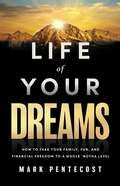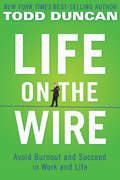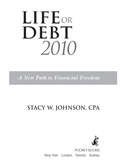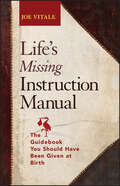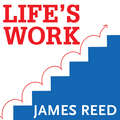- Table View
- List View
Life is a Bicycle: A Living Philosophy to Finding your Authenticity
by Garry FitchettA new philosophy for finding joy and fulfillment through work, and identifying the career path that&’s right for you. Historically, men and women have worked to provide the bare essentials for everyday life. Life is a Bicycle examines work&’s higher purpose: to nurture the advancing mind and unfold the soul. It is your birthright to express yourself harmoniously through your daily work. Using the bicycle as a metaphor for the journey, this book lets you discover: The largest collection of quotes ever assembled capturing the art of discovering sincere, heartfelt workFour fountainheads that reveal and spur your desire, will, and lovePrinciples that will guide you through an evolution of thought en route to your professional bestEnlightening exercises and insightful questions designed to reveal your true natureThe mechanics—but more importantly the heart and soul—of how to discover your professional authenticity If you believe your talent, energy, and appetite indicate ideal work that is capable of bringing out your best while reaping the greatest professional enjoyment possible—and this is the life you want—then you must answer the question: Who&’s riding my bicycle?
Life of Adam Smith
by John RaeAdam Smith was born at Kirkcaldy, in the county of Fife, Scotland, on the 5th of June 1723. He was the son of Adam Smith, Writer to the Signet, Judge Advocate for Scotland and Comptroller of the Customs in the Kirkcaldy district, by Margaret, daughter of John Douglas of Strathendry, a considerable landed proprietor in the same county.
Life of Your Dreams: How to Take Your Family, Fun, and Financial Freedom to a Whole 'Notha Level
by Mark PentecostA USA Today Bestseller! From teacher and coach to self-made billionaire, Mark Pentecost reveals the seven steps that took him from surviving to thriving, inspiring readers to dream big, take action, and transform their own lives.Life of Your Dreams by Mark Pentecost offers an empowering roadmap for those who feel stuck in the cycle of day-to-day survival, unable to pursue their true potential. Mark&’s journey from high school math teacher struggling to make ends meet to billionaire entrepreneur and philanthropist proves that daring to dream bigger can lead to extraordinary results. In this inspiring and practical guide, Mark shares his seven transformative steps to break free from "The Dependence Dilemma"—the self-imposed barriers of financial obligations, fear of risk, and the illusion of security that hold many back from realizing their dreams. Drawing on personal experiences and lessons learned, Mark provides actionable advice and mindset shifts to help readers transcend stagnation and achieve the life they desire. In Life of Your Dreams, readers will discover how to: Master the 7 steps for breaking free from dependency patterns. Identify and overcome the two biggest barriers to personal growth. Understand how to assess and take calculated risks that lead to breakthrough results. Cultivate a "live on the offense" mindset to turn challenges into opportunities. Build a supportive community to propel your progress. Create an action plan for achieving unimaginable goals. If you&’re ready to stop playing it safe and start living your dreams, this book offers the tools, strategies, and inspiration to get there.
Life of the Party
by Bob Kealing'She was one of the most important businesswomen of the 20th century, the prototype for all these Facebook and Google women who are leaning in.' Before Martha Stewart and Mary Kay, there was Brownie Wise, the charismatic Tupperware executive who converted postwar optimism into a record breaking sales engine powered by ordinary housewives. Having started her own business after divorcing her alcoholic husband, the plucky Southern businesswoman caught the eye of Tupperware inventor Earl Tupper, whose plastic containers were collecting dust on store shelves. The now legendary Tupperware Party that Wise popularised, a masterclass in the soft sell, drove Tupperware's sales to stratospheric heights. It also gave poorly educated and economically invisible postwar women, including many African-American women, an acceptable outlet for making their own money for their families - and for being rewarded for their efforts. With the people skills of Dale Carnegie, the looks of Doris Day, and the magnetism of Eva Peron, Wise was as popular among her many devoted followers as she was among the press, and in 1954 she became the first woman to appear on the cover of Business Week. Then, at the height of her success, Earl Tupper fired her under mysterious circumstances, wrote her out of Tupperware's success story, and left her with a pittance. He walked away with a fortune and she disappeared - until now. Originally published as Tupperware Unsealed, Life of the Party is a revised and updated edition perfectly timed to take advantage of this trail-blazing dynamo returning to the spotlight where she belongs.
Life of the Party: The Remarkable Story of How Brownie Wise Built, and Lost, a Tupperware Party Empire
by Bob KealingThe incredible story of Brownie Wise, the Southern single mother--and postwar #Girlboss--who built, and lost, a Tupperware home-party empireBefore Mary Kay, Martha Stewart, and Joy Mangano, there was Brownie Wise, the charismatic Tupperware executive who converted postwar optimism into a record-breaking sales engine powered by American housewives. In Life of the Party, Bob Kealing offers the definitive portrait of Wise, a plucky businesswoman who divorced her alcoholic husband, started her own successful business, and eventually caught the eye of Tupperware inventor, Earl Tupper, whose plastic containers were collecting dust on store shelves. The Tupperware Party that Wise popularized, a master-class in the soft sell, drove Tupperware's sales to soaring heights. It also gave minimally educated and economically invisible postwar women, including some African-American women, an acceptable outlet for making their own money for their families--and for being rewarded for their efforts. With the people skills of Dale Carnegie, the looks of Doris Day, and the magnetism of Eva Peron, Wise was as popular among her many devoted followers as she was among the press, and she become the first woman to appear on the cover of BusinessWeek in 1954. Then, at the height of her success, Wise's ascent ended as quickly as it began. Earl Tupper fired her under mysterious circumstances, wrote her out of Tupperware's success story, and left her with a pittance. He walked away with a fortune and she disappeared--until now. Originally published as Tupperware Unsealed by the University Press of Florida in 2008--and optioned by Sony Pictures, with Sandra Bullock attached to star--this revised and updated edition is perfectly timed to take advantage of renewed interest in this long-overlooked American business icon.From the Hardcover edition.
Life on the Wire: Avoid Burnout and Succeed in Work and Life
by Todd DuncanImbalance is natural.The key is to make it purposeful.In Life on the Wire, New York Times best-selling author Todd Duncan challenges the status quo in search of a better, smarter way to work and live. He profiles several people striking out to find "balance." You'll meet an entrepreneur, a bartender, and an accountant, among others. You'll hear their stories, their challenges, their insights, and the critical lessons they learned.Duncan contends the last thing we need amid life's inherent imbalance is another attempt at a how-to formula for perfect balance-equal parts work and life. In fact, he argues that such a holy grail does not exist. Instead, he has issued a more pragmatic formula he calls purposeful imbalance: the process of purposefully leaning toward work without sacrificing life and purposefully leaning toward life without damaging your career. It is precisely the way a tight-rope walker makes his way across a one-inch rope without falling."I've always believed that when you're at work, you should work hard, and when you're at home, you should play hard. That's easy to say, but for a lot of people it's hard to do. In Life on the Wire, Todd Duncan clears up the myth about the 'balanced' life and shows you how to rejoice in the purposeful--and planned-- imbalanced life."--Dave Ramsey, Best-Selling author and host of The Dave Ramsey Show"This book quickly shows you how to get more done, of greater importance, and less time, and dramatically increase the quality of your entire life."--Brian Tracy, Best-Selling author of Eat That Frog!EO and founder of Todd"Open these pages and discover practical yet potent advice for pursuing your dreams and living your life well!" --Glenna Salsbury, CSP, CPAE Speaker Hall of Fame, author of The Art of the Fresh Start and Professional Speaker"Todd has really touched on an important perspective regarding 'Life Balance.' Timely and relevant . . . reading this book will give you a nice bit of personal peace."--Terri Sjodin, principle and founder, Sjodin Communications
Life or Debt 2010
by Stacy JohnsonHOW WOULD YOU FEEL IF YOU NEVER HAD TO PAY OFF ANOTHER DEBT AGAIN? NO CREDIT CARD PAYMENTS! NO MORTGAGE PAYMENTS! NO AUTO LOAN PAYMENTS! If your answer is "free" or "secure" or even "happy," then this step-by-step guide to eliminating debt forever is the book for you. Stacy W. Johnson, the creator of the personal finance news series Money Talks, has already helped millions of people get out of debt, achieve financial freedom, and earn from wise investments. Now, just by reading this down-to-earth book filled with no-nonsense facts, you too can share the secrets of an amazing program that will allow you to regain control and win you financial freedom for the rest of your life. Practical worksheets (each with detailed examples) will help you figure out the real numbers you need to know: How much do you really earn? How much do you really owe? How do you create a personalized DEBT DESTROYER? And finally, when you are free of debt forever, learn the ultimate tool that will transform the rest of your life...how to convert your Debt Destroyer into a Money Machine that will keep you solvent and happy even after you retire.
Life's Little Financial Instruction Book
by Joseph BisignanoJoseph Bisignano knows that there are a multitude of approaches to managing money. It doesn't require a college degree. What is required is a personalized financial management plan to meet your goals and expectations. The author shares the simple but valuable lessons that will put you back on the road to financial freedom. No gimmicks, no 1-900 schemes . . . just straight talk on things you should know about your money. This is not a "how-to-get-rich-quick" scheme, however. What reading this will do is instruct you in how to make smarter choices in managing the money you earn-from spending to saving to investing it. Think about it. Are you living day to day, paycheck to paycheck, barely getting by? And if you are, how badly do you want to get out of this state? Now you can. If you want more than working all week just to break even, Life's Little Financial Instruction Book is where to start. Joseph Bisignano is a New York State Certified Business Teacher and holds both master's and bachelor's degrees in vocational education. While in management for a New York company, he won the prestigious American Foundryman Award for Achievement. The author of The Joy of Job Hunting, he operates Professional Resumes of Liverpool (NY) and conducts job hunting/outplacement seminars.
Life's Messy, Live Happy: Things Don't Have to Be Perfect for You to Be Content
by Cy WakemanA simple shift in thinking can change everything you believe about your own happiness.By the time we become adults, most of us have joined the religion of suffering, which preaches that unless circumstances are controlled, life will be a mess. We compare ourselves to others and speculate about an impossible-to-know future, holding out hope for an improved life through getting ahead, fulfilling passion, or finding true love. But the idea that happiness comes from putting effort toward altering one’s circumstances is harmful and backward. What if we instead learned to understand that circumstances can rarely be controlled, and that life is, and always will be, messy?From that starting point, we could learn to use our minds to create happiness despite life’s ever-changing circumstances and events. Life’s Messy, Live Happy by Cy Wakeman is about dramatically changing the level of happiness you feel in your daily life, by learning to disconnect happiness from external forces, stop worrying about the future, and realize that most of your negative feelings are about things that never even happened.Wakeman is a credible, relatable teacher—a business owner, mother, and community member who has lived her philosophy and achieved profound happiness and success in a crazy, messy life. Filled with concrete daily practices and true stories that are hilarious, painful, and poignant, this book will change everything: your perspective, your focus, and your energy level for everyday life.
Life's Missing Instruction Manual: The Guidebook You Should Have Been Given at Birth
by Dr. Joe VitaleWith humorous stories and insights, an author and marketing guru offers life lessons for achieving success and happiness. In the simple, straightforward tone of an instructional manual, this little book offers big wisdom and little-known secrets for living a better life. Packed with life lessons most people will wish they'd learned earlier, Life&’s Missing Instruction Manual presents practical steps readers can use to take control of their lives, overcome any obstacle, and find fulfillment. Each simple lesson is brought into focus with real-life examples and includes practical steps for putting those lessons to work every day. Full of uncommon knowledge and lighthearted humor, this book will help readers develop confidence, create winning strategies to get ahead, build rapport with others, develop time-management skills, and find wealth and happiness. Readers will discover how to: * Take chances that lead to success * Get through the tough times * Be themselves and like it * Find a purpose * Work as a team * Create a blueprint for success * Believe in themselves * Lead a good and moral life * Accept mistakes and move on * Define success for themselves &“In a world of confusion and stress, it&’s a relief and a joy to have this book to read and to give to family and friends.&” —Jack Canfield, co-creator, #1 New York Times–bestselling Chicken Soup for the Soul series and author, The Success Principle
Life's Work: 12 Proven Ways to Fast-Track Your Career
by James ReedThe third and final book in the REED career trilogy (after Why You? and The 7 Second CV), Life's Work is a practical, inspirational guide full of advice to help you create a fulfilling career wherever you are in life, from the UK's best-known authority on jobs and careers.'Life's Work is a candid, practical and empowering book for those looking to find meaningful work at all stages of life . . . offers unique and unexpected insights into how to build and sustain a rewarding career' - FE News'Helps young and not-so-young hopefuls get ahead' - Sunday Times By the time you retire you'll have spent a third of your life working. That's far too long to be stuck in a job you hate or even just tolerate. But where to start? Life's Work will show you 12 proven ways to fast track your career, so when you leap out of bed every Monday morning you'll be ready to take on the world. The book is written by James Reed, Chairman of REED, Britain's best-known recruitment brand. Over the past 25 years he has helped millions of people find jobs. This has given him a deep insight into what makes some people successful in building a rewarding career, while others are stuck in the confusion and frustration of not landing the job they want. Through these multiple observations and conversations, James has learned that there are 12 key ways to build and sustain the career you want. You will learn how to: · Be (sustainably) selfish · Kick start some good habits and kick out some bad ones · Think in days and decades · Be powerful, be prepared · Find a boss you can learn from Today's job landscape allows you more freedom to carve your own path than ever before. Along with this, however, comes the responsibility of shaping your mind and actions to make your career work for you. This book shows you how.'Full of ways to fast-track your career' - The Sun'Persuades you to think more deeply' - Bookbag
Life's Work: 12 Proven Ways to Fast-Track Your Career
by James ReedThe third and final book in the REED career trilogy (after Why You? and The 7Second CV), Life's Work is a practical, inspirational guide full of advice to help you create a fulfilling career wherever you are in life, from the UK's best-known authority on jobs and careers.'Life's Work is a candid, practical and empowering book for those looking to find meaningful work at all stages of life . . . offers unique and unexpected insights into how to build and sustain a rewarding career' - FE News'Helps young and not-so-young hopefuls get ahead' - Sunday Times By the time you retire you'll have spent a third of your life working. That's far too long to be stuck in a job you hate or even just tolerate. But where to start?Life's Work will show you 12 proven ways to fast track your career, so when you leap out of bed every Monday morning you'll be ready to take on the world. The book is written by James Reed, Chairman of REED, Britain's best-known recruitment brand. Over the past 25 years he has helped millions of people find jobs. This has given him a deep insight into what makes some people successful in building a rewarding career, while others are stuck in the confusion and frustration of not landing the job they want. Through these multiple observations and conversations, James has learned that there are 12 key ways to build and sustain the career you want. You will learn how to: · Be (sustainably) selfish · Kick start some good habits and kick out some bad ones · Think in days and decades · Be powerful, be prepared · Find a boss you can learn from Today's job landscape allows you more freedom to carve your own path than ever before. Along with this, however, comes the responsibility of shaping your mind and actions to make your career work for you. This book shows you how.'Full of ways to fast-track your career' - The Sun'Persuades you to think more deeply' - Bookbag
Life's Work: 12 Proven Ways to Fast-Track Your Career
by James ReedThe third and final book in the REED career trilogy (after Why You? and The 7 Second CV), Life's Work is a practical, inspirational guide full of advice to help you create a fulfilling career wherever you are in life, from the UK's best-known authority on jobs and careers.'Life's Work is a candid, practical and empowering book for those looking to find meaningful work at all stages of life . . . offers unique and unexpected insights into how to build and sustain a rewarding career' - FE News'Helps young and not-so-young hopefuls get ahead' - Sunday Times By the time you retire you'll have spent a third of your life working. That's far too long to be stuck in a job you hate or even just tolerate. But where to start? Life's Work will show you 12 proven ways to fast track your career, so when you leap out of bed every Monday morning you'll be ready to take on the world. The book is written by James Reed, Chairman of REED, Britain's best-known recruitment brand. Over the past 25 years he has helped millions of people find jobs. This has given him a deep insight into what makes some people successful in building a rewarding career, while others are stuck in the confusion and frustration of not landing the job they want. Through these multiple observations and conversations, James has learned that there are 12 key ways to build and sustain the career you want. You will learn how to: · Be (sustainably) selfish · Kick start some good habits and kick out some bad ones · Think in days and decades · Be powerful, be prepared · Find a boss you can learn from Today's job landscape allows you more freedom to carve your own path than ever before. Along with this, however, comes the responsibility of shaping your mind and actions to make your career work for you. This book shows you how.'Full of ways to fast-track your career' - The Sun'Persuades you to think more deeply' - Bookbag
Life's Work: Alan Alda
by Alan Alda Leslie A. Perlow Pankaj Ghemawat Daniel Mcginn Adi Ignatius Robert C. Pozen Greg Welch Erin Meyer Elizabeth J. Altman Sandra J. Sucher Eunice Eun Matthew Preble Forest Reinhardt Michael W. Toffel Andrei Hagiu Constance N. Hadley Alison Beard Erik Simanis Duncan Duke Oliver Sng Melanie Whelan Kimberly A Whitler Neil A. Morgan D. Eric Boyd Caren Fleit S. P. Kothari Melissa A. Schilling Ginni Rometty Joe TripodiBest known for playing Hawkeye Pierce on the TV series "M*A*S*H," actor Alan Alda is also a director, scriptwriter, book author, science-show host, and founder of two organizations that help people improve their communications skills. In this interview, he shares his insights on the value of the imperfect and explains how improvisation can help teams gel.
Life's Work: Alan Alda
by Alan Alda Leslie A. Perlow Pankaj Ghemawat Daniel Mcginn Adi Ignatius Robert C. Pozen Greg Welch Erin Meyer Robert S. Kaplan Elizabeth J. Altman Jill Avery Sandra J. Sucher Eunice Eun Matthew Preble Forest Reinhardt Ethan S. Bernstein Michael W. Toffel Ryan W. Buell Andrei Hagiu Constance N. Hadley Alison Beard Oliver Sng Melanie Whelan Kimberly A Whitler Neil A. Morgan D. Eric Boyd Caren Fleit S. P. Kothari Melissa A. Schilling Ginni Rometty Joe TripodiBest known for playing Hawkeye Pierce on the TV series "M*A*S*H," actor Alan Alda is also a director, scriptwriter, book author, science-show host, and founder of two organizations that help people improve their communications skills. In this interview, he shares his insights on the value of the imperfect and explains how improvisation can help teams gel.
Life's Work: Alan Alda
by Alan Alda Alison BeardAn Interview with Alan Alda by Alison Beard The veteran of stage and screen on improvisation, bonding with your colleagues, and other secrets of great communication
Life's Work: Katie Couric
by Katie CouricKatie Couric talks about the difference between network news and digital news and between morning and evening shows.
Life's Work: Marina Abramovic
by Alison Beard Marina AbramovicAn Interview with Marina Abramović by Alison Beard The extreme performance artist on stamina and creativity
Life's Work: Mike Krzyzewski
by Timothy Butler Mike Krzyzewski Karen Harris David Harding A. G. Lafley Adi Ignatius Roger L. Martin Ian C. Macmillan Rita Gunther Mcgrath Hal Gregersen Brent Adamson Ron Ashkenas Scott Cook Scott Berinato Leslie K. John Nicholas Toman David Champion Alison Beard Martin Ihrig Michael Mankins Mitchell Lee Marks Philip Mirvis Anthony Heyes Cristina Gomez Daniel Mochon Doug Mcmillon Erik Roelofsen Frederic Cumenal Janet Schwartz Jorgen Vig Knudstorp Oliver Emrich Samina Karim Steven Prokesch Tao YueThe famous Duke University basketball coach discusses his four-decade career, how he recruits and disciplines his players, the difference between college basketball and Olympic basketball, and how he views retirement.
Life's Work: Mike Krzyzewski
by Mike Krzyzewski Alison BeardAn Interview with Mike Krzyzewski by Alison Beard On recruitment, retirement, and contentment
Life's Work: Penn Jillette
by Penn Jillette Alison BeardHBR Interview. "An Interview with Penn Jillette by Alison Beard The magician talks about how he and his partner, Teller, develop their ideas, what kind of relationship they have, and the secret to connecting with an audience."
Life's a Bitch and Then You Change Careers: 9 Steps to Get You Out of Your Funk & on to Your Future
by Andrea KayGet out of your job funk and onto the career path of your dreams with this guide featuring expert advice for career changers of every age.Life’s a Bitch and Then You Change Careers is like a series of one-on-one sessions with veteran career counselor Andrea Kay. She takes you through the nine steps that have helped countless clients realize their potential and change their lives. The process begins with defining a career objective that’s based on who you are, not what others think you should be. Kay then offers a practical, step-by-step plan for making the shift, addressing every issue from research and training to networking, interviewing, and landing your ideal job. Along the way, you’ll find helpful exercises and real-life examples of Kay’s clients who have made the transition to a happier working life. Kay’s personable writing style, vast knowledge, and years of experience make this life-changing book the next best thing to an in-person consultation.
Life's a Pitch... Then You Buy
by Don PeppersLearn How To Get Everything You Want And More In The Ultimate Book On The Not-So-Gentle Art Of Persuasion From Don Peppers, Pitchman Extraordinaire And Author Of The One-To-One Future(46,000 Sold). In business, a pitch is a closed-end, winner-take-all contest. It involves one prospective customer and two or more hopeful suppliers, each struggling to defeat the others and win the account. Sometimes the business is won on the basis of price, but often -- especially where professional services are concerned -- the determining factor is intangible. Who, the client wants to know, will fight hardest for me in court, come up with the most inspired ad campaign, bring my products to the most new markets? InLife's A Pitch. . . And Then You Buy, Don Peppers shows us how to craft a pitch that is guaranteed to simultaneously win the confidence (and business) of prospective clients and defeat the competition. Peppers's fail-safe system teaches mastery of three levels of the pitch: salesmanship, psychology, and game theory. Peppers believes that the strongest pitches appeal to a person's emotional makeup and the very subtle, extremely personal "hot buttons" that make each of us into feeling and thinking creatures. Peppers shows how you can design pitches that capture your clients' hearts and throw your competition off balance at the same time. In fast-paced prose, Peppers covers all the bases, including: overcoming objections, seeing eye-to-eye with your prospects, speaking the customer's language, prospecting, and follow-up. No matter what field you're in, Peppers's lessons will help you master the art of persuasion. From the Hardcover edition.
Life, Death, and Property Rights: The Pharmaceutical Industry Faces AIDS in Africa
by Debora L. Spar Nicholas BartlettIn the final years of the 20th century, the world was hit by a plague of epidemic proportions--AIDS, a life-threatening disease that remained stubbornly immune to any cure or vaccine. In the developed nations of the West, AIDS was slowly brought under control through a combination of education, prevention, and cutting-edge medicines. But in the developing world, where health care expenditures were often paltry, AIDS continued to rampage. By the year 2000, 25 million people in Africa alone were infected with the disease. Millions had already died. Nearly all of the medicines that treated AIDS had been developed--at great expense--by the major western pharmaceutical firms. These medicines were expensive to produce and often difficult to administer. They demanded levels of income and structures of distribution that often were sorely lacking in the developing world. Increasingly, activist groups were demanding that the pharmaceutical companies respond to the AIDS epidemic with drastic measures, giving their drugs away for free or abandoning the patent rights that had long protected their intellectual property. The pharmaceutical firms needed to respond to their critics. The question was, how?



